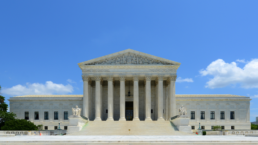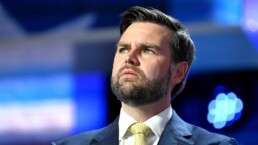Dozens of cities and states sued oil giants for deceiving the public. The Supreme Court could soon break these cases out of limbo.
by Kate Yoder, Grist
It’s been eight years since the world learned that “Exxon Knew.” The oil giant had grasped the dangers of burning fossil fuels since 1977, investigations showed, despite its long-standing public stance that the science was “uncertain” and persistent efforts to block legislation that would control carbon pollution. The revelations launched a wave of lawsuits that aimed to put fossil fuel companies on trial for deceiving the public about climate change.

In 2017, cities and counties in California started the trend by suing dozens of oil, gas, and coal companies using state “tort” laws meant to protect people from deceptive advertising. Attorneys general in other states filed similar suits of their own, beginning with Rhode Island in 2018. It spurred speculation that Big Oil might face a reckoning for misleading the public about the dangers of climate change, much as Big Tobacco did in the 1990s after decades spent denying that smoking could cause cancer.
In the ensuing years, not a single one of these consumer-protection cases — now numbering nearly two dozen — made it to trial. They have bounced around between federal and state courts, with oil companies maneuvering to delay any action. “It says something about what the industry thinks is the power of these cases, that it has kept these up in procedural battles for over five years now,” said Karen Sokol, a law professor at Loyola University in New Orleans.
The procedural battles might soon end when the Supreme Court reviews Suncor v. Boulder County later this year, a case that promises to be a turning point for climate litigation. The court will either hear the case (the oil industry’s choice) or send it back to state courts where state and local governments say it belongs. The decision could remove the dam that’s been standing in the way of the lawsuits that states, cities, and counties have brought against fossil fuel giants. Cases that have been languishing for half a decade could finally be heard, with the chance that oil companies would be called to face trials for violating state laws that guard the public against false advertising.
“The fossil fuel companies are afraid of state courts,” said Denise Antolini, a law professor at the University of Hawaii. “They are petrified of state courts who are closer to the problem, closer to the issues, and absolutely terrified of going in front of juries of real people.”
The Colorado case began in 2018, when the city and county of Boulder, along with San Miguel County in the southwest corner of the state, sued Suncor Energy and ExxonMobil, seeking millions of dollars to update their infrastructure to withstand climate change. They argued that the oil companies violated the state’s consumer protection laws by producing and selling fossil fuels in Colorado despite understanding that using their products would lead to more dangerous heat waves, wildfires, droughts, and floods, like the ones the state is seeing today.
Oil companies have argued that the lawsuit isn’t really about deceptive marketing, but the bigger question of climate change, and issues of that scale should be handled by federal courts — which just happen to be considered more friendly to big corporations. Their claim is that if cases like Colorado’s proceeded in state court, it would interfere with federal laws around greenhouse gas emissions. And if the Colorado lawsuit lands in federal court, “it would be on the grounds that the claims are something different from the claims that the plaintiff had made,” Sokol said. “And so this is basically a defendant’s dream, right?” The oil companies would likely argue that the case should be thrown out in federal court, too, saying such big questions should be left to Congress.
Judges have repeatedly rejected oil companies’ line of reasoning, including those appointed by the Trump administration. In October, the Supreme Court turned to the Biden administration for guidance, asking the U.S. Solicitor General to weigh in with a legal opinion on where the case belongs. That’s a good indication that the court is very interested in the case — a petition is 46 times more likely to be granted after the court asks for the solicitor general’s advice, research has shown.
The coming months may finally provide some clarification on whether the strategy driving dozens of climate lawsuits could actually work — or whether it’s time to pursue a new approach.
There are two ways that the Supreme Court could push these lawsuits forward, with similar outcomes. It could decide not to hear the case, or it could agree to hear it and side with Boulder. In either scenario, the consumer-protection cases would proceed in state courts, and “we’ll start to actually see some litigation,” Sokol said.
The cases would move onto “discovery,” a pre-trial step in which both sides gather evidence from documents and witnesses. “The civil discovery system and the subpoena authority of civil courts is quite powerful,” Sokol said. “We would fill in even more than we already know — and we already know a lot.”
The furthest along of any of these accountability lawsuits is one filed in Hawaii in 2020, with the city and county of Honolulu seeking damages from companies including ExxonMobil, Chevron, and Sunoco. A Hawaii judge has ordered for the discovery process to begin, despite an ongoing appeal by the industry. “What I expect to see in the next year would be discovery battles, with additional motions, as the case slowly marches forward,” Antolini said. The suit is progressing faster than others because Hawaii’s judges have prioritized moving it forward, she said.
Once these lawsuits proceed to trial, juries would be presented with a decades-long trail of evidence that documents how fossil fuel giants deceived the public about climate change. New evidence has recently emerged that could help plaintiffs make a stronger case.
For example, a recent study from Harvard researchers analyzed 40-year-old climate models created by ExxonMobil scientists, finding that their projections ended up predicting actual temperature changes with startling accuracy. They conveyed the severity of the situation to corporate officials — who proceeded to cast doubt on the credibility of climate science, deriding models and emphasizing how “uncertainty” made them virtually useless. “If this were to get to a jury, that’s the sort of evidence that’s important,” Sokol said.
What’s more, the science of being able to attribute specific droughts, floods, and heat waves to climate change is getting better every year. Studies showing how fossil fuel emissions have contributed to these disasters “will be really important” to building the plaintiffs’ case in these lawsuits, said Korey Silverman-Roati, a fellow at Columbia Law School.
In the other scenarios, the Supreme Court could side with oil companies and decide to hear Suncor v. Boulder County and then rule in their favor. States would have to rethink their whole approach.
“Given the current inclinations of the United States’ Supreme Court, it’s nerve-wracking to see them take up this case,” said Antolini, who supports the state lawsuits. “What the U.S. Supreme Court decides will have an impact on all of these cases.” Attorneys general in several states suing oil companies did not respond to or declined Grist’s request to comment.
The cases would, in theory, proceed. But it’s unclear how suits filed over state laws designed to protect against corporate deception would play out in federal courts. “I’m uncertain what all the city, county, and state officials would do in those circumstances, because if it’s on the grounds that ‘Hey, this is actually a federal claim’ — that’s not the claim that they filed, and the claim that they and their staff have spent so much time developing,” Sokol said. “I don’t think it necessarily means that they will lose, but they’ll be at a significant disadvantage.”
Federal courts can decide state law claims in some cases, although judges don’t necessarily like to do it, Antolini said. “It would be ridiculous to see these state law cases end up, across the country, in federal court. It would be really absurd.”
Some other routes to legal action have already been tried and abandoned, such as New York state’s lawsuit that accused ExxonMobil of misleading shareholders about climate change. In 2019, a judge ruled that the New York state attorney general had failed to provide enough evidence that Exxon broke the law. Since then, Exxon has used the ruling to support the idea that the lawsuits against them are misguided. But the judge who ruled in Exxon’s favor made clear at the time that the suit was “a securities fraud case, not a climate change case.”
And there’s at least one completely new approach that doesn’t depend on the Supreme Court’s ruling.
A first-of-its-kind lawsuit filed by 16 towns in Puerto Rico in November accuses Chevron, ExxonMobil, Shell, and other fossil fuel companies of colluding to conceal how their products contribute to climate change. Their argument is that this collusion violated antitrust laws and the Racketeer Influenced and Corrupt Organizations Act, or RICO — a federal law passed in 1970 to take down the Mafia.
Racketeering cases relying on RICO have not only taken down mobsters like John Gotti and the Gambino crime family, but have also been successful against the Hell’s Angels biker gang, the Key West police department in Florida, as well as opioid manufacturers and tobacco companies. The Puerto Rico lawsuit seeks to make companies pay billions of dollars for the extensive damages that towns suffered during hurricanes Maria and Irma in 2017.
Because the lawsuit was filed in federal court, it won’t be pulled into the jurisdictional tug-of-war that has made other climate cases drag on for years.
“They’ve made it easy to prove,” said Melissa Sims, an attorney at Milberg, the Tennessee-based law firm representing the Puerto Rican cities, “because unlike all the other racketeering cases that have been on file, none of them included a written battle plan with a detailed division of labor on how they were going to accomplish their deception.”
Recent Posts
Is A Citizens United 2.0 Right Around The Corner?
July 15, 2025
Take Action Now Is it possible for American democracy to be further degraded by the influence of billionaires? Thanks to champion of the working…
U.S. Leaders Gave Up On Diplomacy With Iran. We Must Make Them Return To It.
July 15, 2025
Take Action Now Building an antiwar movement means preventing the systemic U.S. aggression that creates the conditions for war.By Hanieh Jodat,…
What To Do When You See ICE In Your Neighborhood
July 14, 2025
Take Action Now How can you deter the Trump administration’s immigrant deportation machine when it pops up in your community? Follow these…
ICE Campaign Of Violence Will Lead To More Deaths
July 14, 2025
Take Action Now Jaime Alanis’s death shows the horrific consequences of a secret police force behaving with utter impunity.By Natasha Lennard, The…




